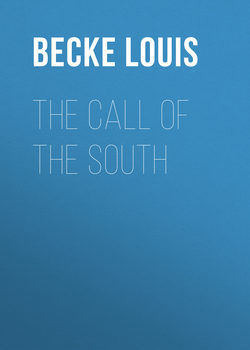Читать книгу The Call Of The South - Becke Louis - Страница 10
CHAPTER VII ~ AT NIGHT
ОглавлениеThe day’s work was finished. Outside a cluster of rudely built palm-thatched huts, just above the curving white beach, and under the lengthening shadows of the silent cocos, two white men (my partner and myself) and a party of brown-skinned Polynesians were seated together smoking, and waiting for their evening meal. Now and then one would speak, and another would answer in low, lazy tones. From an open shed under a great jack-fruit tree a little distance away there came the murmur of women’s voices and, now and then, a laugh. They were the wives of the brown men, and were cooking supper for their husbands and the two white men. Half a cable length from the beach a schooner lay at anchor upon the still lagoon, whose waters gleamed red under the rays of the sinking sun. Covered with awnings fore and after she showed no sign of life, and rested-as motionless as were the pendent branches of the lofty cocos on the shore.
Presently a figure appeared on deck and went for’ard, and then a bright light shone from the fore-stay.
My partner turned and called to the women, speaking in Hawaiian, and bade two of them take their own and the ship-keeper’s supper on board, and stay for the night Then he spoke to the men in English.
“Who keeps watch to-night with the other man?”
“Me, sir,” and a native rose to his feet.
“Then off you go with your wife and Terese, and don’t set the ship on fire when you and your wife, and Harry and his begin squabbling as usual over your game of tahia."2
The man laughed; the women, pretending to be shocked, each placed one hand over her eyes, and with suppressed giggles went down to the beach with the man, carrying a basket of steaming food. Launching a light canoe they pushed off, and as the man paddled the women sang in the soft Hawaiian tongue.
“Happy beggars,” said my comrade to me, as he stood up and stretched his lengthy, stalwart figure, “work all day, and sit up gambling and singing hymns—when they are not intriguing with each other’s husbands and wives.”
The place was Providence Atoll in the North Pacific, a group of seventeen uninhabited islands lying midway between the Marshall and Caroline Archipelagoes—that is to say, that they had been uninhabited for some years, until we came there with our gang of natives to catch sharks and make coco-nut oil. There was no one to deny us, for the man who claimed the islands, Captain “Bully” Hayes, had given us the right of possession for two years, we to pay him a certain percentage of our profits on the oil we made, and the sharks’ fins and tails we cured. The story of Providence Atoll (the “Arrecifos” of the early Spanish navigators, and the “Ujilang” of the native of Micronesia) cannot here be told—suffice it to say that less than fifty years before over a thousand people dwelt on the seventeen islands in some twelve or fourteen villages. Then came some dread disease which swept them away, and when Hayes sailed into the great lagoon in 1860—his was the first ship that ever entered it—he found less than a score of survivors. These he treated kindly; but for some reason soon removed them to Ponapé in the Carolines, and then years passed without the island being visited by any one except Hayes, who used it as a rendezvous, and brought other natives there to make oil for him. Then, in a year or so, these, too, he took away, for he was a restless man, and had many irons in the fire. Yet there was a fortune there, as its present German owners know, for the great chain of islands is covered with coco-nut trees which yield many thousands of pounds’ worth of copra annually.
My partner and I had been working the islands for some months, and had done fairly well. Our native crew devoted themselves alternately to shark catching and oil making. The lagoon swarmed with sharks, the fins and tails of which when dried were worth from sixty to eighty pounds sterling per ton. (Nowadays the entire skins of sharks are bought by some of the traders on several of the Pacific Islands on behalf of a firm in Germany, who have a secret method of tanning and softening them, and rendering them fit for many purposes for which leather is used—travelling bags, coverings for trunks, etc.)
The women helped to make the oil, caught fish, robber-crabs and turtle for the whole party, and we were a happy family indeed. We usually lived on shore, some distance from the spot where we dried the shark-fins, for the odour was appalling, especially after rain, and during a calm night. We dried them by hanging them on long lines of coir cinnet between the coco-palms of a little island half a mile from our camp.
2
“Tahia” is a gambling game played with small round stones; it resembles our “knuckle-bones”.
